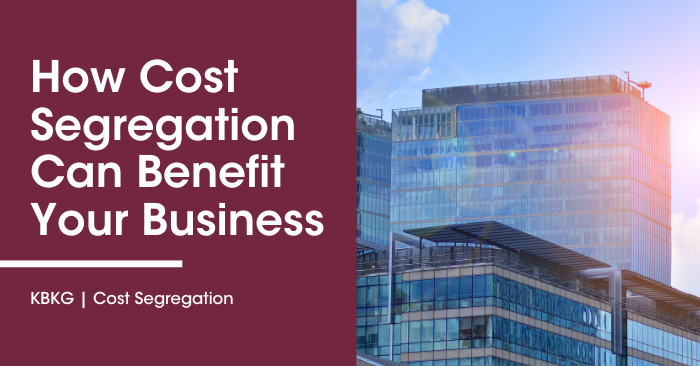Cost Segregation: How It Can Benefit Your Business
Tax planning is a vital part of any company’s financial strategy. At its core, it focuses on legal ways of optimizing tax breaks and reducing liabilities. Maybe you’ve heard the term “cost segregation” used by tax professionals. You may wonder, “What is a cost segregation study and how can it benefit my organization?” This guide explains some basics of this method and how KBKG can help you take advantage of its benefits.
What Is Cost Segregation?
Cost segregation is a powerful tax planning strategy. Real estate investors use it to accelerate depreciation, boost their cash flow, and postpone some federal and state income taxes. The process typically involves separating a building’s cost components into specific asset classifications and recovery periods. This technique focuses on frontloading, shifting real estate asset depreciation deductions to earlier years of ownership.
Cost Segregation Studies
To take advantage of cost segregation, one must determine an asset’s depreciable components. This is the core goal of a cost segregation study. Qualified tax professionals conduct such studies for their clients, aiming to speed up depreciation over a shorter time span. These experts abide by a strict code of ethics requiring honesty, impartiality, integrity, objectivity, and professionalism.
A cost segregation professional starts by reviewing essential details for the assets. After discovering each asset’s components, the specialist typically places them into one of four categories:
- Building improvements such as roofs, walls, and floors
- Land improvements, which can include sidewalks, driveways, and parking lots
- Personal property like furniture, fixtures, and equipment
- Land, which encompasses components not included in the first three categories
Depreciation Categories and Rates
Many property components fall into one of these four tax categories — usually between 20% to 40%, depending on the asset. Cost segregation allows these to be written off more quickly. Certain land or building improvements can be depreciated over 15 years. Some personal property components are eligible for five-year lives, while others qualify for seven-year depreciation. Compare these terms to typical building depreciation spanning over 27.5 or 39 years.
Section 179’s Depreciation Impacts
Cost segregation already offers significant benefits, but the IRS tax code provides even more advantages. Section 179 of the code allows businesses to deduct expenses instantly on depreciable business equipment purchases. These usually include purchased or financed equipment such as vehicles, office machines, and computers. However, other eligible items can include furniture and fixtures plus qualified improvement property.
A Section 179 deduction can be a viable alternative to longer-term capitalization and depreciation. The IRS sets a maximum deduction of $1,080,000 for equipment that entered service in 2022. The total amount of qualifying equipment must be $2,700,000 or less. The agency recently updated these rules. Starting with the 2023 tax year, the new deduction cap is raised to $1,160,000, and the total costs of qualifying Section 179 property cannot exceed $2,890,000.
Bonus Depreciation and Section 179
Perhaps you’ve heard about the expiration of 100% bonus depreciation. Between 2018 and 2022, the IRS permitted deductions for up to 100% of asset costs on bonus depreciation qualified improvement property. Bonus depreciation now phases out by 20% each year until it completely goes away in 2026.
With this change in mind, Section 179 deductions may be your best solution. You’ll want to consider three key limitations for these deductions: investment, income, and maximum dollar amounts. Also, remember that some items may not qualify for 179: buildings and structural components, land and land improvements, and rental properties.
Your Cost Segregation Experts
From this guide, you should now understand what is a cost segregation study and the advantages it offers to your organization. KBKG delivers comprehensive studies with excellence, expertise, integrity, and professionalism. Request a proposal online or call us at (877) 525-4462.


